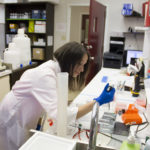“I work 80 hours a week, therefore you must also work this long to be successful.” Spoiler alert: if your expectation is that we all work 80 hours/week – I will fail to meet expectations.
This attitude is everywhere in academia: from the evolving nature of ‘scholarship’ to outright shaming those who don’t put in face-time every weekend and holiday. As a student, it’s demoralizing to hear and read these conversations all the time. Whether it’s on Twitter, overheard in the hallway, or talking about the ‘culture of busy’ with colleagues, the singular definition of success as an exclusive commitment to your work is harmful.
Why do I pursue interests outside of the lab?
- Graduate programs in the sciences are notoriously terrible at teaching students to communicate science appropriately and effectively.
Delivering science programming to kids as a volunteer with Girl Guides of Canada, and developing social media content with the Beatrice Hunter Cancer Research Institute has helped me learn to relate to different attitudes and perspectives on science. These are not academic pursuits, but they certainly help my training as a Ph.D. scientist. - Graduate school provides little-to-no training on key management skills.
These include human resources and people management, budgeting, as well as risk identification and mitigation, to name a few. But – principal investigators are expected to hire, direct, and evaluate students and staff, to manage budgets (of more money than I have ever seen), and to manage concrete and strategic risks… while directing a strong research program. Volunteers not only get insight into the operations of local, national, and international organizations, but often receive training on many of the management skills that are necessary to run research projects and collaborative teams. - I am a human being. An 80-hour workweek leaves very little time to be human. In order to take care of myself – including my mind, my heart, and my motivation – I have to set aside time to turn off the screen, put away my papers, and chill out. Believe me, I notice when I don’t. My health concerns are minor, so I can only imagine how challenging it is for my colleagues who set aside many more hours to protect their health. I also only have to look out for myself (& my cat). Expectations of an 80-hour work week are impossible for many people, especially those with chronic health conditions or with substantive care-giving responsibilities. (For more on these topics, here’s a great post by Raul Pacheco-Vega, and a piece in Times Higher Education.)
- I believe innovation does not take place within a vacuum. Gravity wasn’t discovered at the lab bench. Fluid displacement wasn’t discovered at the lab bench. We find new ways of doing things, of thinking about science, of talking about science, when we interact with the world around us. Connecting with kids, hearing from community activists, advocating for policy change, raising money for research alongside friends and neighbours… these all impact the way I see the world.
Which innovators are we turning away from science when, even in jest, we talk about working eighty hours per week? What skills are we devaluing when we expect students to commit to graduate school to the exclusion of everything else? Knowing that most science graduate programs still consider everything outside academic research as an “alternate career”, how do we respect personal and professional development for the broad range of possible careers when we ask (again, even in jest) for 80 hours/week?
When I started graduate school, I u sed to joke that I had sold my soul to science. A few years later, I have realized that I owe it to myself to make sure science doesn’t take my soul. That doesn’t mean I am any less dedicated, any less successful, or any less of a scientist. It means that I value what science brings to my life and what my life experience brings to science.
sed to joke that I had sold my soul to science. A few years later, I have realized that I owe it to myself to make sure science doesn’t take my soul. That doesn’t mean I am any less dedicated, any less successful, or any less of a scientist. It means that I value what science brings to my life and what my life experience brings to science.


One Reply to “Academic culture and the “80-hour work week””